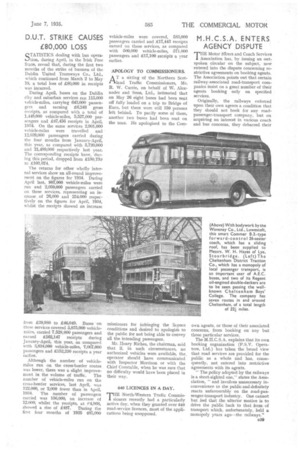D.U.T. STRIKE CAUSES £80,000 LOSS
Page 53

If you've noticed an error in this article please click here to report it so we can fix it.
Q T ATIS T IC S dealing with bus opera tion, during April, in the Irish Free State, reveal that, during the first two months of the strike of busmen of the Dublin "United Tramways Co., Ltd., which continued from March 2 to May 18, a total loss of £80,000 in receipts was incurred.
During April, buses on the Dublin city and suburban services ran 115,000 vehicle-miles, carrying 643.000 passengers and earning £6,248 gross receipts, as compared with a total of 1,449,000 vehicle-miles, 5,527,000 passengers and £47,456 receipts in April, 1934. On the same services 2,901,000 vehicle-miles were travelled and 12,039,000 passengers carried during the four months from January-April, this year, as compared with 5,720,000 and 21,489,000 respectively last year. The corresponding receipts have, during this period, dropped from 2180,791.) to £103,674.
The returns for other wholly internal services show an all-round improvement on the figures for 1934. During April last, 987,000 vehicle-miles were run and 2,059,000 passengers carried on these services, representing an increase. of 26,000 and 254,000 respectively on the figures for April, 1934, whilst the receipts showed an increase from £39,980 to £46,049. Buses on these services covered 3,875,000 vehiclemiles, carried 7,528,000 passengers and earned £162,147 receipts during January-April, this year., -as compared with 3,834,000 vehicle-miles, 7,097,000 passengers and £152,230 receipts a year earlier.
Although the number of vehiclemiles run on the cross-border routes was lower, there was a slight improvement in the volume of traffic. The number of vehicle-miles run on the cross-border services, last April, was 122,000, or 2,000 fewer than in A.pril, 1934. The number of passengers carried was 156,000, an increase of 12,000, whilst the receipts, at :174,968, showed a rise of £487. During the first four months of 1935 485,090
vehicle-miles were covered, 583,000 passengers carried and £17,443 receipts earned on these services, as compared with 609,000 vehicle-miles, 571,000 passengers and £17,100 receipts a year earlier.
APOLOGY TO commissiONERs.
AT a sitting of the Northern Scotland Traffic Commissioners, Mr. R. W. Currie, on behalf of W. Alexander and Sons, Ltd., intimated that on May 26 eight buses had been sent off fully loaded on a trip to Bridge of Earn, hut there were still 150 persons left behind. To pacify some of them, another two buses had been sent on the tour. He apologized to the Corn
missioners for infringing the licence conditions and desired to apologiie to the public for not being able to convey all the intending passengers.
Mr. Henry Riches, the chairman, said that if, in such circumstances, no authorized vehicles were available, the. operator should have communicated with Inspector Morrison or with the Chief Constable, when he was sure that no difficulty would have been placed in their way.
Z40 LICENCES IN A DAY.
Pri-IE North-Western Traffic Commis'. sioners recently had a particularly active day, when they granted over 640 road-service licences, most of the applications being unopposed.
M.H.C.S.A. ENTERS AGENCY DISPUTE
TE Motor Hirers and Coach Services Association has, by issuing an out7 spoken circular on the subject, now -entered into the dispute concerning restrictive agreements on booking agents. The Association points out that certain railway-associated road-transport companies insist on a great number of their agents booking only on specified services.
Originally, the railways enforced upon their own agents a oondition that they should not book for any roadpassenger-transport company, but on acquiring an interest in various coach and bus concerns, they debarred their
own agents, or those of their associated concerns, from booking on any but those particular services.
The explains that its own booking organization (P.S.V. Operators, Ltd.) has taken the broad view that road services are provided for the public as a whole and has, consequently, not entered into restrictive agreements with its agents.
" The policy adopted by the railways is a short-sighted one," states the Association., "and involves unnecessary inconvenience to the public and definitely reacts unfavourably on the road-passenger-transport industry. One cannot but feel that the ulterior motive is to drive the public back to that formof transport which, unfortunately, held a monopoly years ago—the railways."




























































































